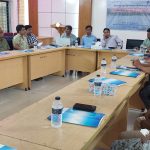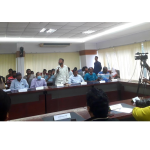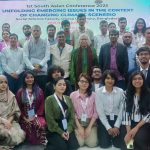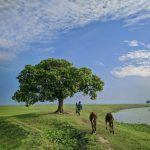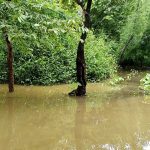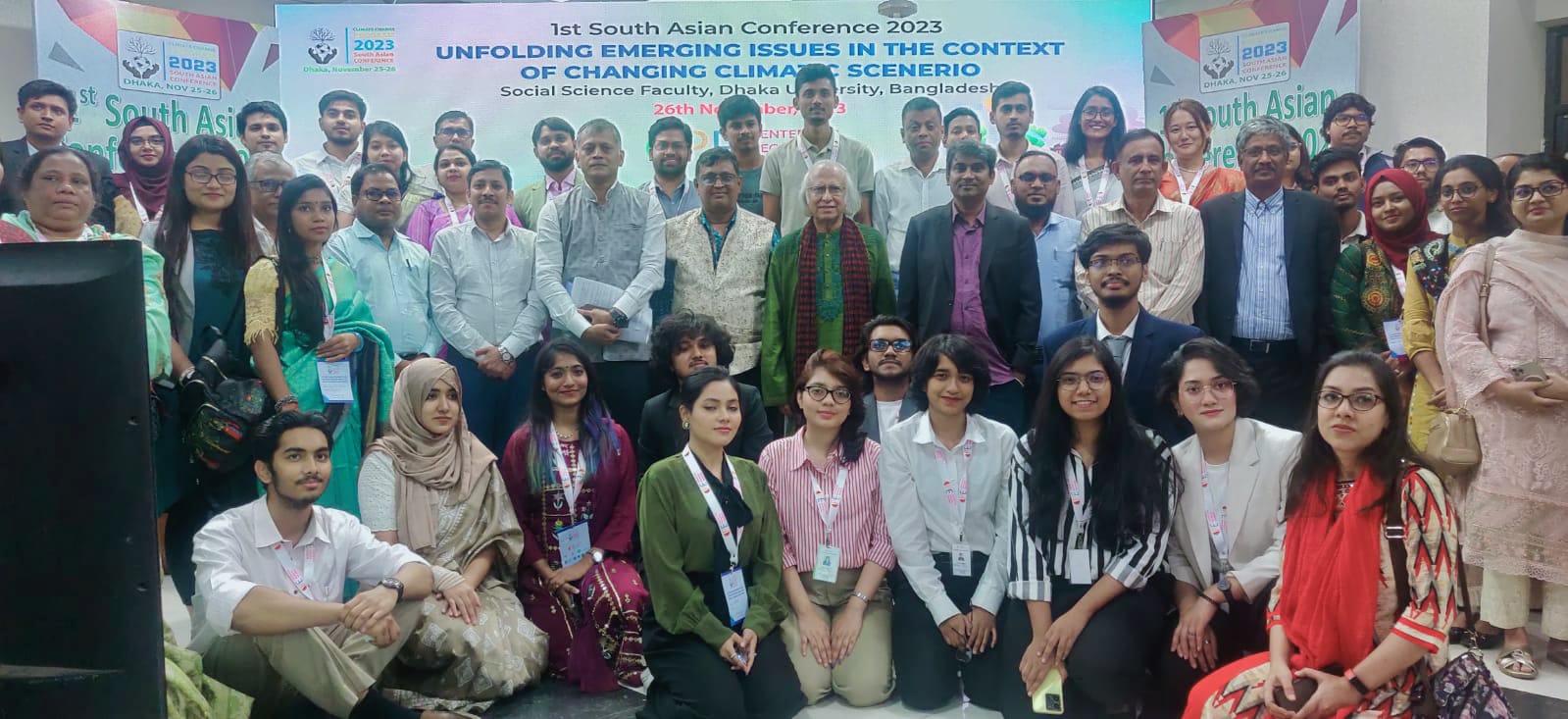Center for People and Environ has organized the South Asian conference on “Unfloding emerging issues in the context of changing climatic scenarios” to open a window for South Asian young scholars and researchers which is a ground-breaking conference designed to address the crucial environmental issues that South Asian countries are facing as a result of climate change. Held over two days, on November 25-26 at Dr. Muzaffar Ahmed Choudhury Conference Hall, Social Science Faculty, University of Dhaka. The conference brought together more than 100 young researchers and early and mid-career scientists from across the South Asian region to delve into the pressing challenges posed by climate change. The eminent Academicians, researchers, policymakers, scientists, and activists from across the region gathered at the conference to discuss the complex interactions between climate change and its multiple effects on a range of sectors, including agriculture, water resources, public health, socioeconomic dynamics, gender inequities, renewable energy, resilient cities, migration and displacement, environmental education for the future, and food security. The conference also developed an early and mid-career research platform from South Asian countries as a “South Asian Research Hub” to promote a common agenda by developing scientific evidence, building capacity, knowledge co-creation, and science-policy integration as an utmost keen interest in resilient South Asia. Aranyak Foundation, Oxfam in Bangladesh, Global Forum for Sustainable Rural Development (GFRSD), Global Center for Climate Change and Environment, BARCIK, LEDARS, Daffodil International University (DIU) were the co-organizers along with Center for People and Environ. At the climate conference, researchers discussed several thematic issues related to the impact of climate change among South Asian countries, such as sustainable development goals, climate policy, sustainable urban development, renewable energy, climate-related migration and displacement of people, food security, climate education, and various issues related to the development of inter-connected among South Asian countries. A commitment was made to work together on solutions and the issues were seriously presented to this entire conference.

Increasing extreme rainfall events (ERE) are observed over India and Bangladesh from July to September. The cropping pattern in Bangladesh is disrupted. Irregular timing of the monsoon causes the crop's optimal time of growth to fall in jeopardy, only resulting in a rather worse harvest. Temperature and salinity of water are the challenges for the rice production. The risk of flood from 1974 got up to 12 times more for 2030’s conditions where Nepal & Bhutan are facing flood due to the glacier melting of the Himalayas.
In the opening session of the conference, Muhammad Abdur Rahaman, Director of the Center for People and Environ delivered an inaugural speech. Mr. Rahaman said the Center for People and Environ has been developing young scholars from Bangladesh since the establishment of the organization. Dr. M. Monirul Qader Mirza, Adjunct Professor and Graduate Faculty Member, Department of Physical and Environmental Sciences, University of Toronto Scarborough delivered the conference keynote in the opening session. Dr. Mirza delivered his speech on “South Asian Research Hub for Climate Change: Rationale, Strategy, Framework & Roles.” He mentioned in his speech, a cross-border approach in the research fields to help the South Asian countries as a whole. He stated that increasing extreme rainfall events (ERE) are observed over India and Bangladesh from July to September. The cropping pattern in Bangladesh is disrupted. Irregular timing of the monsoon causes the crop’s optimal time of growth to fall in jeopardy, only resulting in a rather worse harvest. Temperature and salinity of water are the challenges for the rice production. The risk of flood from 1974 got up to 12 times more for 2030’s conditions where Nepal & Bhutan are facing flood due to the glacier melting of the Himalayas. He suggested that the future infrastructure for Climate Change and engineering should be implemented, i.e: the railway line from Beijing to Lhasa. In the north, agriculture and other economic activities are planned with more mitigation than in the south of India.
In the opening session, the conference chair Tapas Ranjan Chakraborty mentioned that in South Asia, we need to share knowledge and imagination to come up with solutions to our environmental hurdles. In the inaugural session Mahmuda Sultana, Program Director, OXFAM in Bangladesh, in cyclone Amphan affected the entire coastal region by damaging people’s houses and livestock where the women suffered the most. Even non-economic Losses also happen due to climate change like the confidence of the community breaks down and their capability of communicating is lost. We also need to address the intersectional differences and bring them up front to work on. Discussant Dr. Jayanta Choudhury, President of, the Global Forum for Sustainable Rural Development (GFRSD) joined from India. He said the usage of bamboo reduces CO2 emissions. Dr. Mohammad Mohinuzzaman, Associate Professor, Department of Environmental Science and Disaster Management, Noakhali Science and Technology University encouraged research sharing data between the South Asian countries. The Chair of the inaugural session of the conference, Dr. M. Shahidul Islam, Chairman, Department of Geography and Environment, University of Dhaka mentioned in his concluding speech, that data sharing between neighboring countries in South Asia is very important to tackle climate change. He also said that we need to find out the hydrological definition of coastal areas.
The conference held on six thematic areas: South Asian Commons., Sustainable Development Goals, Resilient Cities and Urban ecosystem, Climate Change (adaptation/ mitigation/ renewable energy, climate policy), South Asia Cooperation for Climate Action, Food, Security, and Education, Climate displacement, migration, human security, and disability inclusion. Three plenary sessions and a poster presentation session were on the 1st day of the conference. In six sessions of this two-day climate conference, 36 research papers and 5 poster presentations from young researchers discussed the problems and solutions of the above-mentioned main topics. Two discussants and a chair conducted each session.
1st plenary session was Coastal Resilience. In the session, Dabaraj Dey, keynote speaker, Engineering and Regional Planning Specialist, Climate Justice and Natural Resource Rights, Oxfam in Bangladesh presented his article “Empowering the Waves: Feminist Climate Movement Building Through Community Based Ecosystem Management in Coastal Bangladesh”. He focused on climate and Gender Justice. He mentioned that to build a feminist climate movement their “Project BID4CJ” works to sustain Gender Justice. In that session, 1st paper was presented by Mizanur Rahman, Research Associate, Center for People & Environ on the topic of “Climate-Induced Migration: Factors and Potential Migration in Coastal Part of Bangladesh”. He said, that due to climatic-induced disasters, fragile livelihoods lead to the forced migration of coastal people. At the end of the session the discussant Tapas Ranjan Chakraborty, conference chair said that people are not migrating by choice, climate change is making them. Shaberu Rahman Shatu, GIS Assistant, BETS Consulting Services Limited presented a poster presentation on “A Comparative Study of Tannery-Induced Environmental Impacts on Dholeshwari River”. Another poster presentation on “Project Folon Reflecting the Attainment of the Sustainable Development Goals” by Rufaida Shafiq Aaneela, Consultant, Give Bangladesh Foundation.
Plenary two was Local-lead Adaptation (LLA). In this session, Dr. Jayanta Choudhury, keynote speaker and president of the Global Forum for Sustainable Rural Development (GFRSD) presented his paper on “Priority of Climate Change and Local Led Adaptation in Rural Asia”. In the session, Katherasala Srinivas, Senior Research Fellow, Department of Social Work, Osmania University, Hyderabad, Telangana, India presented his abstract paper on “Adaptation of Smart Farming Techniques and Effects of Crop Management a Descriptive Study of Farmer’s Perspective”. The research reveals that the smart Farming Technique (SFT) is a novel feature that guarantees the application of supplies, equipment, and labor in field practice limiting unnecessary resources. SFT can track animal positions. This study can assist farmers in boosting their output, income sustainability, and crop quality but it must overcome several difficulties before that. In this session, Dr. Mohammad Mohinuzzaman, Associate Professor, Department of Environmental Science and Disaster Management, Noakhali Science and Technology University presented his research paper on “Contrasting Responses of Fluorescence Dissolved Organic Matter (FDOM) to the Salinity Gradient Due to Upcoming Global Warming”. Dr. Mohinuzzaman shows how changes in FDOM components are due to increasing salinity in his paper. Fazle Rabbi Sadeque Ahmed, Director, Climate Change Program, Palli Karma-Sahayak Foundation discussion on the presented papers. He said that the climate is changing at an exponential rate. Teachers and students from our country should participate in research more. This session was conducted by Abu Sadat Moniruzzaman Khan, Programme Head of, the Climate Change Programme, BRAC as a chair.
Plenary 3 was Nature Based Solution (NbS). In the session, the keynote speaker was Koushik Roy, LEDARS. He presented his research paper on “Nature-based Solution: Challenges and Opportunities in Coastal Areas of Bangladesh”. In this session, 5 abstracts were presented. Abhishek Shrestha, Agriculture and Forestry University, Bradibas, Nepal presented his research paper on “Green Technologies Intervention in Sugarcane in the Context of Nepal”. Khaled MD. Mehzabin Alam Prottoy, Research Assistant, Center for People and Environ (CPE) presented his abstract on “Enhancing River Ecosystem through Nature-based Solutions: A Case Study on Sucker Fish in the Buriganga River”. He mentioned that the river ecosystem is threatened by fast industrialization, urbanization, population growth, etc. He found that Sucker fishes are both food and space competitive to bottom feeders. He suggested a nature-based solution to restore fish diversity. Dr. Saptashi Mitra, Department of Geography and Disaster Management, University of Tripura, India was the discussant of the session.
Beginning the 2nd day of the conference, plenary session 4 was Climate Migration, Social Protection, and Human Security. Professor Dr. Amir Mohammad Nasrullah, Department of Public Administration, Chittagong University presented his research paper on “Rehabilitation Initiatives for The Climate Induced Displaced Persons in Bangladesh: A Critical Evaluation on some NGO Interventions in Chittagong” as a keynote speaker. From his study, he showed that people of 26 districts would face climate change migration who face displacement are referred to as ‘Trapped people. People are deprived of basic rights as a result of displacement: housing, land, property, food, education, health, sanitation, safety & security. Dr. Nasrullah claimed that policies are not implemented properly due to funding & they find no land for the people who are displaced. Alternative livelihood, community people involvement, climate hotspots, and indigenous knowledge should be increased. Zereen Saba, Research Officer, Center for People & Environ presented his study on “Disability Inclusion in Climate Resilient Infrastructure: A Cross-Sectional Study in Four Coastal Sub-Districts of Bangladesh”. According to the participants of the study area, a safe drinking water crisis was faced by 98% of the people. Another abstract was presented by Md. Rafiqul Islam, Lecturer, Department of Economics, Tejgaon College on “The Wage Dynamics in the Climate-vulnerable Areas of Bangladesh from the Perspective of Gender, Age, and Seasonality”. His study reveals that male gets more wages than female & children and gender-based resilience program should be taken. After the abstract presentation, discussant Dr. Mohan Kumar Das, Executive Director of, the National Oceanographic and Maritime Institute (NOAMI) discussed on overall plenary session. Dr. Das claimed that the northwestern part of Bangladesh is more susceptible to Norwester, the northeastern part of Bangladesh is susceptible to flood and coastal areas are vulnerable to erosion, salinity, and storm surge. In some seasons, agro-based economic people have no earning source. People migrate for the betterment of their lives and security issues.
Dr. Mohan Kumar Das, Executive Director of, the National Oceanographic and Maritime Institute (NOAMI) conducted the plenary session 5 on Resilient City as a chair. MD. Jahangir Alam, Coordinator, of BARCIK was a keynote speaker in the session. He presented his research article on “Climate Crisis and Urban Resilience”. The study represented that, four million people live in Dhaka slams and deprived kids doing risky jobs such as plastic, battery, chemical & leather factories. He suggested that must follow 3R: Reduce, Reuse, and Recycle. An abstract presented by S M Sium, Department of Geography and Environment, University of Dhaka on “Correlation between Land Surface Temperature (LST) and Major Air Pollutants (MAP) in Greater Dhaka Region: A Geospatial Approach”. He showed in his study that land Surface Temperature and air Pollutant Parameters changed from 1989 (25-27 Degree Celsius) to 2023 (31-33 Degree Celsius). Anthropogenic factors are the main factors of these drastic changes. Dhaka’s air pollutant index is 75 times higher than the standard level. A paper on Riverbank erosion impact assessment of rural households with morpho-hydrological analysis by Umme Salma, Shahjalal University of Science and Technology. Another study on “Time Series Assessment of Air Pollution in the Dhaka North City Corporation based on Concentration of PM2.5 using Linear Regression Model” by Sumaiya Zakir, Department of Geography and Environment, Jahangirnagar University. Her study showed that traffic emission in Dhaka city is 35%. During monsoon season particulate matter, concentration is less because of humid conditions. During winter, season particulate matter concentration is higher because of dry conditions.
The last plenary session was on Environmental Conservation. Professor A.Z.M Manzoor Rashid, Chairman, of Arannayk Foundation hosted the session as a chair. In the session, keynote speaker Dr. Md. Abdul Kuddus, senior advisor, Arannayk Foundation presented his research paper on “Forest Landscape Restoration Planning and Piloting in Chittagong Hill Tracks: Arannayk Foundation’s Experience and Way Forward. A paper on Nepal’s Mountain Tourism: A Beacon of Climate Resilience for South Asia by Shanti Tamang, LLM in International Law, South Asian University. A presenter Prakriti Adhikari presented her research article on Climate Justice in Nepal: Exploring Equity and Sustainability in a Developing Nation.
Seven thematic areas of South Asia Research Hub are: Sea Level Rise and Coastal Ecosystems, Nature-based Solutions, Local-led Adaptation, Climate Migration, Human Security, and Social Protection, Climate and Health Nexus, Biodiversity and Food Security, and Resilient Cities.
In the closing session, Muhammad Abdur Rahman, Director of the Centre for People and Environ, announced the ‘Dhaka Declaration’ and the ‘South Asian Research Hub’ to build capacity among South Asian early and mid-career researchers on climate change. He announced seven thematic areas of the South Asia Research Hub: Sea Level Rise and Coastal Ecosystems, Nature-based Solutions, Local-led Adaptation, Climate Migration, Human Security, and Social Protection, Climate and Health Nexus, Biodiversity and Food Security, and Resilient Cities.
Research opportunities for young people are less in South Asia. Research opportunities will be created for young researchers by forming the 'South Asian Research Hub
The chairman of the Dhaka School of Economics, Dr. Kazi Khalikuzzaman Ahmad, was discussed as the chair of the conference’s closing session. He said, “Research opportunities for young people are less in South Asia. Research opportunities will be created for young researchers by forming ‘South Asian Research Hub”. Conference Speaker Dr. Monirul Quader Mirza stated in his closing speech, “I think the Dhaka Declaration is a very timely initiative. Through this, research opportunities will be opened among young researchers in South Asia”. Also Dr. Jayant Chowdhury, Assistant Professor Department of Rural Studies, Tripura University, India; Prof Dr. Om Katel, Department of Environment and Climate Studies, College of Natural Research, Bhutan; Dr. Purnika Kumari Seelagama, Senior Lecturer, Department of Sociology, University of Peradeniya, Sri Lanka; Dr. Papiya Dutta, Associate Professor, and Head, Department of Rural Development, University of Science and Technology, India; Dr. Mohindar Kumar Slaria, Associate Professor (Sociology), Department of Higher Education, India; Agreed with the aims and objectives of the ‘Dhaka Declaration’ and the ‘South Asia Research Hub’.


